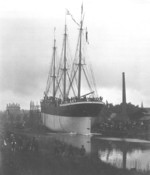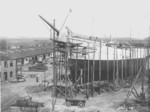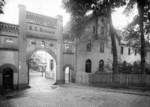Rickmers
| Type | 223 Shipyard | |
| Historical Name of Location | Bremerhaven, Weser-Ems, Germany | |
| Coordinates | 53.549028000, 8.581522000 |
Contributor: Al Griffis
ww2dbaseRickmer Clasen Rickmers was born in Helgoland, Germany on 6 Jan 1807. In 1832, Rickmers and his financee Etha Reimers left Helgoland in a small boat for Bremerhaven, Germany. Four years later, he signed a lease for three years on a plot of land in Bremerhaven right on the banks of the Geeste and established the firm Heloglander Rickmer Classen Rickmers to build vessels. The keel of its first vessel, a 23-ton barge, was laid down in Jul 1836. In 1839, the lease was extended for 15 years, and the shipyard acreage was doubled in order to expand the size of the slips for larger ships. By 1842, Rickmers was a shareholder in several ships. In 1847, the number of employees approached 100 as orders continued to increase. Around this time, orders were being turned down because the ships being ordered were larger than shipyard could produce; negotiations with various land owners and shipyards dragged on for the next five years without any success. In 1856, a new site 65,000 square meters in size, also on the Geeste, was found to expand operations. Within one year, the shipyard facilities at the new site were brought up to date, including housing for the shipyard workers. The old yard consisted of two longitudinal slips, a small forge, blacksmiths, carpenters, and a few other necessary workshops; the new yard had four slips and the most modern workshops in order to construct any vessels needed. In 1870, Rickmers' cargo fleet made trips to the far east and bring back rice as return freight. In 1872, Rickmers acquired a rice distribution company. In 1878, it purchased the Bremer Rice Mill Company; by 1884, it would become the largest company of that type in the world. In 1886, Rickmer Clasen Rickmers passed away; his son Andreas Rickmers, at the age of 79, took over the company. In 1889, various holdings were consolidated into a single entity, Rickmers Reisuhlen, Rhederei, Schiffbau AG. In 1890, Rickmers built its final wooden ship, the Etha Rickmers. Between 1889 and 1891, and then again between 1893 and 1894, the third shipyard modification took place to accommodate the varied Rickmers family businesses: shipbuilding (including an additional slip and conversion from wood to iron ship construction), merchant shipping, and rice processing. In 1893, the company established the Norddeutsche Reismuhle milling company in Hamburg, Germany. In 1894, the company established the A. Markwold Company in Bangkok, Thailand. In 1895, another shipyard modernization program was undertaken to correct some of the features missed in the most recent modernization completed in the previous year. In 1901, all nine German rice mills, including those under Rickmers control, were detached from their various parent companies to form the Reis- und Handels AG based in Bremen, Germany. In 1910, in order to keep up with the times, more than one million German Marks was invested to bring the shipyard current; shipyard equipment and power machines were either replaced or renovated, many buildings were erected, slips upgraded, and a new power station was built. In 1914, the shipyard was closed at the beginning of WW1, but it reopened in Feb 1915 after the German Navy approached it with orders; total orders for WW1 were 12 patrol boats and three minesweepers with delivery dates between 1916 and 1919. In 1923, as the economic situation in Germany grew worse, it was once again decided to close down the shipyard until the shipbuilding industry improved. In 1936, the shipyard reopened once again, and in the following two years the two slips were strengthened and lengthened. Meanwhile, a new slip was constructed in 1937; trawlers displacing 1,200 tons and under would be built in this new slip. During WW2, Rickmers remained busy, but ever increasing bombings took their toll. During WW2, Rickmers's size was about 94,000 square meters, and it employed about 500 employees. It completed a number of minesweepers for the German Navy. By late 1944, the shipyard ceased operations due to excessive amount of damage done to its facilities. After the war, it remained in operations. In 1967, company owner Bertram Rickmers expanded operations to a third site, and ship repair operations began at the new site by 1968. In the 1970s, most of the shipbuilding operations moved to the new site. By 1984, only steel work remained at the original sites. In 1972, the two companies Rickmers and Bremer Vulkan jointly established a dock and repair yard in Bremerhaven. Rickmers shipyard closed in 1986 due to poor business, but the Rickmers-Vulkan joint venture lives on today as Rickmers Lloyd Dockbetrieb, controlled by Lloyd Werft Bremerhaven GmbH.
Last Major Update: Aug 2019
Ships Constructed at Rickmers
| Ship Name | Yard No | Slip/Drydock No | Ordered | Laid Down | Launched | Commissioned |
| M280 | 242 | |||||
| M271 | 233 | 8 Jul 1942 | 26 Jan 1943 | |||
| M272 | 234 | 16 Sep 1942 | 20 Mar 1943 | |||
| M273 | 235 | 21 Nov 1942 | 12 May 1943 | |||
| M274 | 236 | 23 Dec 1942 | 10 Jun 1943 | |||
| M275 | 237 | 25 May 1943 | 31 Aug 1943 | |||
| M276 | 238 | 17 Aug 1943 | 28 Oct 1943 | |||
| M277 | 239 | 25 Nov 1943 | 1 Feb 1944 | |||
| M278 | 240 | 25 Jan 1944 | 18 Apr 1944 | |||
| M279 | 241 | 4 Jul 1944 | 18 Oct 1944 | |||
| M101 | 229 | 27 Sep 1939 | 1 Sep 1940 | 15 Mar 1941 | 22 Sep 1941 | |
| M102 | 230 | 27 Sep 1939 | 1 Feb 1941 | 1 Aug 1941 | 28 Apr 1942 | |
| M103 | 231 | 27 Sep 1939 | 1 May 1941 | 3 Dec 1941 | 28 Apr 1942 | |
| M104 | 232 | 27 Sep 1939 | 1 Oct 1941 | 1 Apr 1942 | 6 Aug 1942 |
Rickmers Interactive Map
Photographs
 |  |  |  |
Rickmers Timeline
| 3 Jul 1836 | Heloglander Rickmer Classen Rickmers laid down the keel of its first vessel, a 23-ton barge, in Bremerhaven, Germany. |
| 18 May 1856 | Heloglander Rickmer Classen Rickmers signed a contract for a site 65,000 square meters in size at Geesthelle, Bremerhaven, Germany to expand operations. |
| 1 Jul 1872 | Heloglander Rickmer Classen Rickmers acquired the rice distribution company Bremer Rice and changed its name to Ichon & Rickmers. |
| 27 Nov 1886 | Rickmer Clasen Rickmers, the founder of Heloglander Rickmer Classen Rickmers, passed away. His 79-year-old son Andreas Rickmers took control of the company. |
Please consider supporting us on Patreon. Even $1 per month will go a long way! Thank you. Please help us spread the word: Stay updated with WW2DB: |
| WW2-Era Place Name | Bremerhaven, Weser-Ems, Germany |
| Lat/Long | 53.5490, 8.5815 |
- » 1,167 biographies
- » 337 events
- » 44,601 timeline entries
- » 1,243 ships
- » 350 aircraft models
- » 207 vehicle models
- » 376 weapon models
- » 123 historical documents
- » 261 facilities
- » 470 book reviews
- » 28,497 photos
- » 365 maps
George Patton, 31 May 1944
Please consider supporting us on Patreon. Even $1 a month will go a long way. Thank you!
Or, please support us by purchasing some WW2DB merchandise at TeeSpring, Thank you!